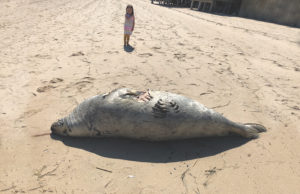 The immense corpse lay on its back on the upper beach, eyes heavenward, although unseeing. Its full abdomen, up-thrust chin, bristly whiskers, and jowly throat suggested a human quality; if fitted with a bowler hat, from a distance it could have been mistaken for a 19th-century British gentleman at leisure. But this notion was belied by the large gash in its underside and the significant bite marks in its side and flippers. These wounds support the very reasonable hypothesis that this animal, a large bull gray seal, was the victim of a great white shark attack.
The immense corpse lay on its back on the upper beach, eyes heavenward, although unseeing. Its full abdomen, up-thrust chin, bristly whiskers, and jowly throat suggested a human quality; if fitted with a bowler hat, from a distance it could have been mistaken for a 19th-century British gentleman at leisure. But this notion was belied by the large gash in its underside and the significant bite marks in its side and flippers. These wounds support the very reasonable hypothesis that this animal, a large bull gray seal, was the victim of a great white shark attack.
The scene is a harborside beach in the East End of Provincetown. Within hours of the dead seal’s appearance, staff from the Center for Coastal Studies and the International Fund for Animal Welfare arrive and proceed to perform a necropsy. Nearby, a group of young people sit, seemingly oblivious to this sad scene, huddled around the tinny sound of the electronic equivalent of a transistor radio. A couple of men in folding chairs sit not far off with their backs to the corpse, sipping mojitos and consciously regarding the horizon. Dog walkers and solitary strollers gaze for a bit and move on. I, too, after a time, go about my business — whatever that is.
I must be careful not to stretch metaphor into meaning until the whole thing doesn’t adhere. But here goes: we are still in the midst of a pandemic of unknown proportions; on top of this, nationwide turmoil in the streets has erupted over continued murders by cops, and police brutality and racial inequality in general.
Yet here we are on the beach on a beautiful day. We know there are sharks out there, but we are (for now) safe on land. We know the virus has not been properly addressed and certainly not resolved; we know our government — especially our president — is woefully and criminally unresponsive to these and other issues; we know that the inequities that feed the protests are deep-rooted and pervasive.
History provides ample and egregious evidence of people turning their backs on horrendous events: ordinary Germans going about their business during the Holocaust while smoke poured from the crematoria; white Americans actively overlooking the dispossession of Native Americans, the internment of Japanese-American citizens during World War II, the mistreatment of migrant children at our southern border, and, of course, the tragedy of the slavery of African Americans and their unequal treatment to this day.
The essential question for each of us is: how much of myself can I devote to these issues? I have just this one life to live and I must live it to the fullest. We — most of us — on the Outer Cape are particularly blessed with a buffer of beauty and distance from the worst of these events. It is easy to be complacent and self-involved.
But there has to be a balance between personal and public life, an uneasy and constantly shifting balance. That means being committed to justice, mercy, compassion, love, care for our environment, and activism. But it also means not being completely overwhelmed by the external world.
As Walt Whitman wrote: “…battles, the horrors of fratricidal war, the fever of doubtful news, the fitful events; these come to me days and nights and go from me again, but they are not the me myself.”
The following morning the beach had been swept clean by the tide, a tabula rasa. What next will wash ashore?



